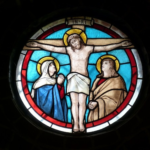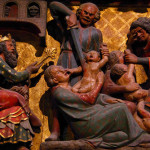We run our website the way we wished the whole internet worked: we provide high quality original content with no ads. We are funded solely by your direct support. Please consider supporting this project.
Podcast: Where Does Forgiveness Fit in a Cruciform Theology?
Greg offers looks at forgiveness in a realm of natural consequences.

Send Questions To:
Dan: @thatdankent
Email: askgregboyd@gmail.com
Twitter: @reKnewOrg
Greg’s new book: Inspired Imperfection
Dan’s new book: Confident Humility
Subscribe:
Category: ReKnew Podcast
Tags: Cruciform Theology, Forgiveness
Related Reading

Why Christ, not Scripture, is Our Ultimate Foundation
In a previous blog I argued that all our theological reflection must not only be Christ-centered, it must, most specifically, be cross-centered. I now want to begin to unpack some of the most important implications of adopting a cross-centered theological perspective. My ultimate goal is to show how a cross-centered theology is able to resolve the…

How NOT to be Christ-Centered: A Review of God With Us – Part II
In Part I of my review of Scott Oliphint’s God With Us we saw that Oliphint is attempting to reframe divine accommodation in a Christ-centerd way. Yet, while he affirms that “Christ is the quintessential revelation of God,” he went on to espouse a classical view of God that was anchored in God’s “aseity,” not…

Podcast: Must We Believe in the Historicity of the OT Stories to Trust in the Bible and in Jesus?
Things get deep, literarily, as Greg discusses deep literalism. http://traffic.libsyn.com/askgregboyd/Episode_0384.mp3

Divine Accommodation in the Early Church
One of the basic points made in The Crucifixion of the Warrior God is that the Old Testament reveals how God adjusts his revelation and instructions to accommodate the weakness of his covenant people. This is actually not a new observation as is reflected in a variety of ways throughout Church history. For example, in…

God’s Love is Cruciform
Paul instructs us in what it means to follow Jesus, when he stated, “Follow God’s example, therefore, as dearly loved children and walk in the way of love, just as Christ loved us and gave himself up for us as a fragrant offering and sacrifice to God (Eph 5:1-2). Here Paul defines what it means to…

Is the Bible History?
Even though I argued for interpreting the final form of the biblical canon as opposed to using the history behind the text in my post yesterday, I am not endorsing the radical post-modern view that biblical texts possess “semantic autonomy” and thus lack any historical referentiality. While I have no problem whatsoever accepting that God used folklore and myth…



